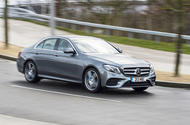Mercedes has introduced a super-efficient diesel-electric hybrid plug-in hybrid powertrain to the E-Class. Is it any good?
Here is a potential solution to the biggest problem with pretty much every plug-in hybrid (PHEV) on sale today.You see, PHEVs represent for many a great stepping stone to the seemingly inevitable fully electric future of motoring. They’re also a boon to company car drivers, thanks to the significant reduction in benefit-in-kind tax rates they bring.That’s great, of course, but many businesses that have replaced diesels with PHEVs have actually seen their fuel bills rise, due to users racking up high mileages, where the economy benefit lessens, or simply never bothering to charge them.While education is a key factor to improving this, it also exposes the main issue with most of today’s PHEVs: once the small electric-only range is gone, you’re left with a heavy car powered by a relatively inefficient petrol engine. Drive a Mitsubishi Outlander PHEV down a motorway on an empty battery and even 30mpg is a particularly ambitious target. Mercedes-Benz is aiming to solve that problem with the E300de: a diesel-electric plug-in hybrid E-Class. It’s an almost unique prospect, not just in its segment but across the whole market. Volvo and Peugeot were the last to sell diesel hybrids in the UK, but those didn’t exactly fly out of showrooms and have long since gone.
Source: Autocar
